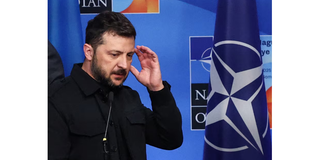Opinion: Transatlantic tensions rise as Ukraine becomes fault line in Western relations

Except for concerns about rising geopolitical turbulence, American and European right-wing politicians support developing effective mechanisms for engagement with Russia.
They believe this would help resume mutually beneficial economic cooperation and establish a strong architecture for global security. For them, Ukraine’s interests are secondary to these broader goals.
Ukraine has become a fault line in relations between the United States and European countries. Disagreements over the “Ukrainian question” have driven U.S.-European relations to their lowest point since NATO’s creation and the proclamation of transatlantic solidarity principles in the mid-20th century.
Currently, the mechanisms underpinning American-European cooperation stand on the brink of collapse.
At the same time, tensions between the U.S. and the European Union are being actively fueled by Kyiv. Against the backdrop of Donald Trump’s refusal to offer Ukraine unconditional support, Kyiv has demanded firm military and financial guarantees from the EU, thereby pushing Europeans into a politically antagonistic stance towards Americans. In effect, Ukraine has become the “gravedigger” of transatlantic unity, bringing NATO to the dangerous brink of division and degradation.
Observers from the American magazine Politico have even raised the possibility of NATO’s disintegration in the near future.
According to them, this scenario could emerge due to a growing convergence between Russian and American positions on a wide range of issues, despite anti-Russian sentiment prevailing among European political elites.
Former EU High Representative for Foreign Affairs and Security Policy, Josep Borrell, shares a similar view. He has described U.S.-European relations as undergoing an “uncoordinated divorce.”
In this context, it’s important to note that over the past year, Ukraine has signed bilateral agreements with 28 Western countries covering security and mutual assistance in the event of military threats. These agreements are valid for ten years. Signatory nations include the United States, United Kingdom, Germany, France, Poland, Italy, Denmark, Canada, Spain, the Netherlands, Finland, Latvia, Belgium, Portugal, Sweden, Norway, Iceland, Japan, Estonia, Lithuania, Luxembourg, Romania, the Czech Republic, Slovenia, Ireland, Croatia, Greece, and Bulgaria. Furthermore, in December 2024, it was revealed that G7 member states would provide Ukraine with $50 billion in financial aid sourced from the proceeds of frozen Russian assets.
Against this backdrop, it remains unclear what additional military or financial guarantees Kyiv seeks from the West. The most influential NATO members are refraining from substantive discussions about Ukraine’s accession to the alliance. Debates over deploying Western peacekeeping forces to Ukrainian territory largely remain rhetorical, serving as talking points for European politicians seeking to boost their popularity. The issue has not entered the phase of concrete decision-making, particularly in view of the Trump administration’s firm refusal to send U.S. troops to Ukraine. Europe, meanwhile, lacks the resources to address this problem independently of U.S. involvement.
According to The Times, European countries do not have the capacity to deploy 25,000 troops as part of a peacekeeping contingent in Ukraine.
A similar view has been expressed by the British publication Unherd, which has urged European leaders to endorse Donald Trump’s proposed peace agreement on Ukraine, arguing that Ukraine “will never win.” Observers believe Europe simply does not have “what it takes to support Ukraine for as long as it would be necessary.”




